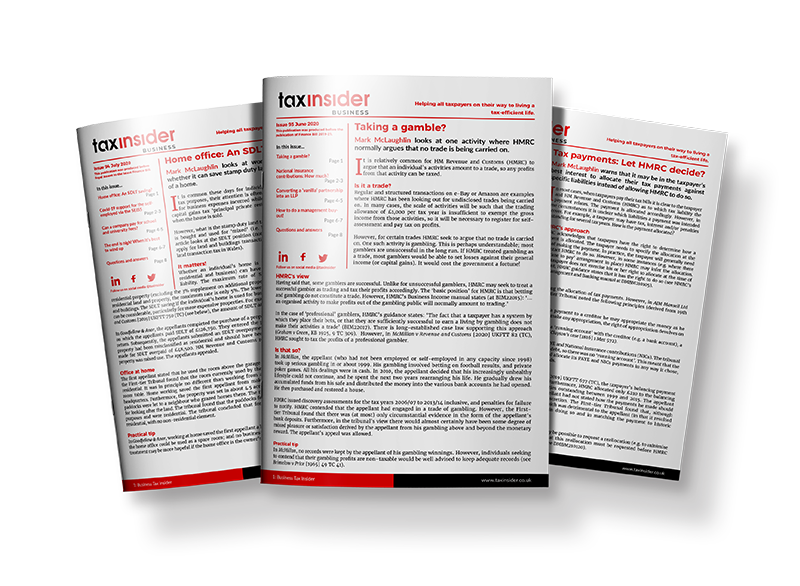 Mark McLaughlin looks at new HMRC powers to make company directors (and others) jointly and severally liable for unpaid tax liabilities.
Mark McLaughlin looks at new HMRC powers to make company directors (and others) jointly and severally liable for unpaid tax liabilities.
This is a sample article from our newsletter, Business Tax Insider. For more monthly business tax tips, start your free trial here.
Business owners want their enterprise to be successful and financially rewarding. Unfortunately, this is not always the case.
If the business fails, HM Revenue and Customs (HMRC) may miss out on unpaid tax liabilities. However, following recent changes, business owners may be unable to walk away and start new businesses with a clean tax slate.
Not so fast…
HMRC can now make company directors and others joint and severally liable for the company’s tax liabilities in certain circumstances that the government had previously considered unacceptable.
The rules allow HMRC to give a ‘joint liability notice’ to individuals if a company liability arises in any of the following three circumstances (these provisions also apply to limited liability partnerships):
- Tax avoidance and tax evasion cases;
- Repeated insolvency and tax evasion cases; and
- Cases involving a penalty for facilitating avoidance or evasion.
Circumstances 1 and 3 are not addressed in this article.
Don’t make a habit of it
The ‘repeated insolvency’ provisions (in 2 above) enable HMRC to issue a notice if the following conditions (A to D) are all satisfied, within certain time limits:
Condition A: The individual had a ‘relevant connection’ with at least two ‘old’ companies in the five-year period before the notice was given; each company became subject to an insolvency procedure during that period; and at the time of the insolvency procedure each company either had a tax liability or had failed to submit a relevant return or another document, etc, or an act or omission prevented HMRC from dealing with a submitted return, document, etc.
Condition B: A ‘new’ company has been carrying on the same or a similar trade or activity as each of the two ‘old’ companies (or any two old companies if there are more than two).
Condition C: The individual has had a ‘relevant connection’ with the new company at any time in the five-year period.
Condition D: When the notice was given at least one of the old companies in question had a tax liability of more than £10,000 and 50% of the companies’ total liabilities to their unsecured creditors.
Joint and several liability
An individual receiving the notice is jointly and severally liable for any amounts:
- due to HMRC from the new company when the notice is issued, and which arise in the five years from the issue of the notice and while the notice remains in effect; and
- amounts still due to HMRC from the old companies in question (if applicable).
The legislation includes definitions for some of the expressions used (e.g. ‘subject to an insolvency procedure’, ‘undergoing a relevant winding up’, ‘in administration’ and ‘in receivership’).
HMRC’s powers are subject to certain safeguards. For example, there is a taxpayer right of review against notices given by HMRC, and there is also a right of appeal to the First-tier Tribunal against notices, both within statutory time limits.
Practical tip
The new regime seems harsh, but at least it is not retrospective. It became effective from 22 July 2020. However, it does not apply to tax liabilities relating to a period ended before 22 July 2020, or to any tax liability (except one relating to a period) arising from an event or default before that date.



